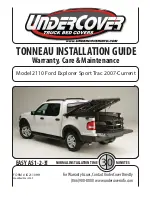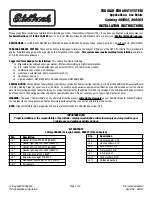
TOWING REQUIREMENTS
To promote proper break-in of your new vehicle drive-
train components, the following guidelines are
recommended:
WARNING!
Improper towing can lead to a collision. Follow these
guidelines to make your trailer towing as safe as
possible:
•
Make certain that the load is secured in the trailer
and that it will not shift during travel. When traile-
ring cargo that is not fully secured, dynamic load
shifts can occur that may be difficult for the driver
to control. You could lose control of your vehicle
and have a collision.
•
When hauling cargo, or towing a trailer, do not
overload your vehicle or trailer. Overloading can
cause a loss of control, poor performance, or dam-
age to brakes, axle, engine, transmission, steering,
suspension, chassis structure, or tires.
•
Safety chains must always be used between your
vehicle and trailer. Always connect the chains to
the frame or hook retainers of the vehicle hitch.
Cross the chains under the trailer tongue and allow
enough slack for turning corners.
•
Vehicles with trailers should not be parked on a
grade. When parking, apply the parking brake on
the tow vehicle. Put the tow vehicle transmission in
PARK. Always block or "chock" the trailer wheels.
•
GCWR must not be exceeded.
(Continued)
WARNING!
•
Total weight must be distributed between the tow
vehicle and the trailer such that the following four
ratings are not exceeded:
○
GVWR
○
GTW
○
GAWR
○
Tongue weight rating for the trailer hitch utilized
CAUTION!
•
Do not tow a trailer at all during the first 500 miles
(805 km) the new vehicle is driven. The engine,
axle or other parts could be damaged.
•
Then, during the first 500 miles (805 km) that a
trailer is towed, do not drive over 50 mph
(80 km/h) and do not make starts at full throttle.
This helps the engine and other parts of the
vehicle wear in at the heavier loads.
Towing Requirements — Tires
•
Proper tire inflation pressures are essential to the
safe and satisfactory operation of your vehicle.
•
Check the trailer tires for proper tire inflation pres-
sures before trailer usage.
•
Check for signs of tire wear or visible tire damage
before towing a trailer.
•
Replacing tires with a higher load carrying capacity
will not increase the vehicle's GVWR and GAWR
limits.
•
For further information
Towing Requirements — Trailer Brakes
•
Do
not
interconnect the hydraulic brake system or
vacuum system of your vehicle with that of the
trailer. This could cause inadequate braking and
possible personal injury.
•
An electronically actuated trailer brake controller is
required when towing a trailer with electronically
actuated brakes. When towing a trailer equipped
with a hydraulic surge actuated brake system, an
electronic brake controller is not required.
NOTE:
This vehicle has an aftermarket brake controller
connector under the dash to the left of the brake
pedal. This will be a four pin connector and will be
gray in color.
•
Trailer brakes are recommended for trailers over
1,000 lb (453 kg) and required for trailers in excess
of 2,000 lb (907 kg).
WARNING!
•
Do not connect trailer brakes to your vehicle's
hydraulic brake lines. It can overload your brake
system and cause it to fail. You might not have
brakes when you need them and could have an
accident.
•
Towing any trailer will increase your stopping dis-
tance. When towing, you should allow for addi-
tional space between your vehicle and the vehicle
in front of you. Failure to do so could result in an
accident.
STARTING AND OPERATING
171
4
Summary of Contents for GLADIATOR 2022
Page 101: ...GETTING TO KNOW YOUR INSTRUMENT PANEL GASOLINE INSTRUMENT CLUSTERS 99 3...
Page 102: ...100 GETTING TO KNOW YOUR INSTRUMENT PANEL...
Page 104: ...DIESEL INSTRUMENT CLUSTERS 102 GETTING TO KNOW YOUR INSTRUMENT PANEL...
Page 105: ...GETTING TO KNOW YOUR INSTRUMENT PANEL 103 3...
Page 327: ...Power Distribution Center Location Gas Engine SERVICING AND MAINTENANCE 325 8...
Page 378: ......
















































